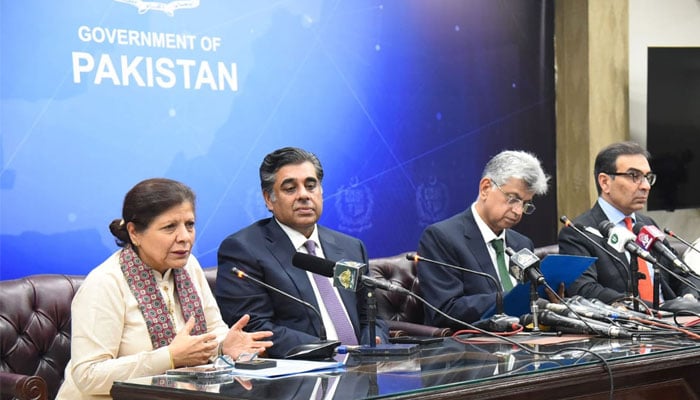Govt says IMF to get back on electricity bill relief plan in 'a day or two'
Caretaker PM directs ministries to “deliver optimal results” so a “strong foundation” is laid for next govt
ISLAMABAD: Caretaker Power Minister Muhammad Ali has said that the government will get a response from the International Monetary Fund (IMF) on its plan to provide relief to electricity consumers in a "day or two".
“The plan to provide relief on electricity bills has been sent to the IMF. The IMF will give a response on the relief plan in a day or two,” Ali said in a press conference after the Special Investment Facilitation Council’s (SIFC) Apex Committee meeting on Friday.
He was addressing the presser along with Caretaker Finance Minister Shamshad Akhtar, Information Minister Murtaza Solangi and Commerce Minister Gohar Ejaz.
The power minister went on to say that they spoke about the electricity bills and gas availability in the country during the apex committee meeting. He added that they discussed the possibility of transferring electricity distribution companies or DISCOs to the provinces and making their boards “non-political”.
The caretaker minister added that the country lacks natural gas and there would be a need for LNG terminals in the coming days.
“There is a gas shortage in the winter and LNG plants will be needed to support the industries,” Ali said, adding that industries should not be closed due to a lack of gas in the winter.
“The power ministry has started working on all these plans,” he said. He also added that they would have to review the gas prices.
Policy on SoE under development: Akhtar
On the other hand, interim Finance Minister Akhtar said that they are developing a policy on state-owned enterprises and establishing a central monitoring unit which will help strengthen the corporate governance of these entities and help various ministries.
The finance czar also added that the move will help take forward the state-owned enterprises for public listing or privatisation in the long run.
“What we are trying is to push the debt burden of state-owned enterprises,” Akhtar said, adding that currently, the burden is solely on the banking sector and the government borrowing from banks also affects that.
“We will diversify it through the capital market. This will not only increase the depth of the capital market but we will try to float government securities on the PSX so that their maturity is stretched and a common man can invest in government securities. This will hopefully have an impact as liquidity will increase and pricing adjustments will happen as well,” the finance minister said.
She further said that there is a “need to revive the economy and end restrictions” on imports. Akhtar added that action is being taken against the smuggling of currency and commodities that will yield a positive result.
PM seeks 'optimal results' from ministries
Meanwhile, as per the official statement issued after the SIFC apex committee meeting, Caretaker Prime Minister Anwaar-ul-Haq Kakar has directed the ministries to “deliver optimal results irrespective of the time” they have so that a “strong foundation” is laid for the next government.
It was the fifth Special Investment Facilitation Council's (SIFC) Apex Committee meeting. The meeting was attended by Chief of Army Staff (COAS) General Asim Munir, federal cabinet members, provincial chief ministers and high-level government officials.
The committee had met the “singular focus” on improving the “overall business and investment environment” in the country which is needed for “economic revival”.
In the high-level huddle, ministries concerned presented their plans and roadmaps to overcome the “macroeconomic challenges, governance-related impediments and voids in regulatory mechanisms in a bid to attract both foreign and domestic investment and stimulate economic growth”.
“The Committee deliberated upon various measures to be taken in short, medium and long term to reap the envisaged dividends. Various practical steps were approved by the Prime Minister that will be operationalised as soon as possible,” the PM Office said.
What is SIFC?
In July, during its last days, former PM Shehbaz constituted the SIFC to provide an impetus to the government's efforts for economic revival. The committee is chaired by the prime minister and comprises the army chief and senior federal ministers.
The formation of the SIFC was announced after the Pakistan Democratic Movement-led government unveiled an elaborate “Economic Revival Plan” with a view to capitalise on Pakistan’s untapped potential in key sectors, fast-track the development projects and facilitate investment.
The plan was unveiled during a high-level meeting chaired by then-prime minister Shehbaz Sharif in Islamabad, which was also attended by General Munir, chief ministers, federal and provincial ministers, and other high-level government officials.
As per the notification, the SIFC is a three-tier composition having an apex, executive committee and implementation committees.
The apex body includes the prime minister, federal ministers (planning, finance, IT & Telecom, food security, power, water resources, industries and production, defence, defence production and investment), chief of the army staff, all chief ministers, national coordinator (Pakistan Army) and special assistant to the prime minister acts as secretary to the body.
However, the executive committee consists of the planning minister, national coordinator (Pakistan Army), federal ministers (defence, food security, IT & Telecom and Power), state ministers (petroleum and finance), provincial ministers (agriculture, mines and minerals, IT, energy, Board of Revenue, irrigation, finance, planning and development and investment), SAPM, chief secretaries, director general (Pakistan Army), secretary Board of Investment.
-
Security forces gun down 30 terrorists in multiple IBOs in KP: ISPR
-
MQM-P calls for new province in Sindh
-
US report validates Pakistan military edge over India: PM
-
Banned TTP poses serious threat to Pakistan security: UNSC panel
-
CM Afridi clarifies remarks on by-poll after ECP requests army deployment
-
Dubai sees 3.2m Pakistani passengers in 2025 as airport sets new milestone
-
Security forces kill 23 Indian proxy terrorists in KP's Kurram
-
Pakistan to construct island to boost oil exploration: report












